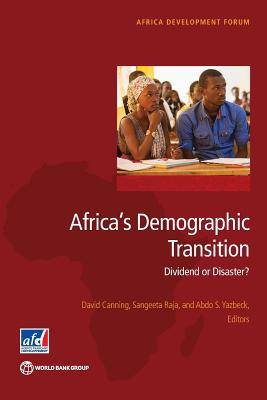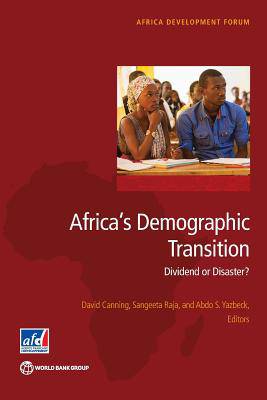
- Afhalen na 1 uur in een winkel met voorraad
- Gratis thuislevering in België vanaf € 30
- Ruim aanbod met 7 miljoen producten
- Afhalen na 1 uur in een winkel met voorraad
- Gratis thuislevering in België vanaf € 30
- Ruim aanbod met 7 miljoen producten
Zoeken
Omschrijving
"Africa is poised on the edge of a potential takeoff to sustained economic growth. This takeoff can be abetted by a demographic dividend from the changes in population age structure. Declines in child mortality, followed by declines in fertility, produce a 'bulge' generation and a large number of working age people, giving a boost to the economy. In the short run lower fertility leads to lower youth dependency rates and greater female labor force participation outside the home. Smaller family sizes also mean more resources to invest in the health and education per child boosting worker productivity. In the long run increased life spans from health improvements mean that this large, high-earning cohort will also want to save for retirement, creating higher savings and investments, leading to further productivity gains. Two things are required for the demographic dividend to generate an African economic takeoff. The first is to speed up the fertility decline that is currently slow or stalled in many countries. The second is economic policies that take advantage of the opportunity offered by demography. While demographic change can produce more, and high quality, workers, this potential workforce needs to be productively employed if Africa is to reap the dividend. However, once underway, the relationship between demographic change and human development works in both directions, creating a virtuous cycle that can accelerate fertility decline, social development, and economic growth. Empirical evidence points to three key factors for speeding the fertility transition: child health, female education, and women's empowerment, particularly through access to family planning. Harnessing the dividend requires job creation for the large youth cohorts entering working age, and encouraging foreign investment until domestic savings and investment increase. The appropriate mix of policies in each country depends on their stage of the demographic transition."
Specificaties
Betrokkenen
- Auteur(s):
- Uitgeverij:
Inhoud
- Aantal bladzijden:
- 214
- Taal:
- Engels
- Reeks:
Eigenschappen
- Productcode (EAN):
- 9781464804892
- Verschijningsdatum:
- 22/10/2015
- Uitvoering:
- Paperback
- Formaat:
- Trade paperback (VS)
- Afmetingen:
- 152 mm x 226 mm
- Gewicht:
- 340 g

Alleen bij Standaard Boekhandel
+ 79 punten op je klantenkaart van Standaard Boekhandel
Beoordelingen
We publiceren alleen reviews die voldoen aan de voorwaarden voor reviews. Bekijk onze voorwaarden voor reviews.











